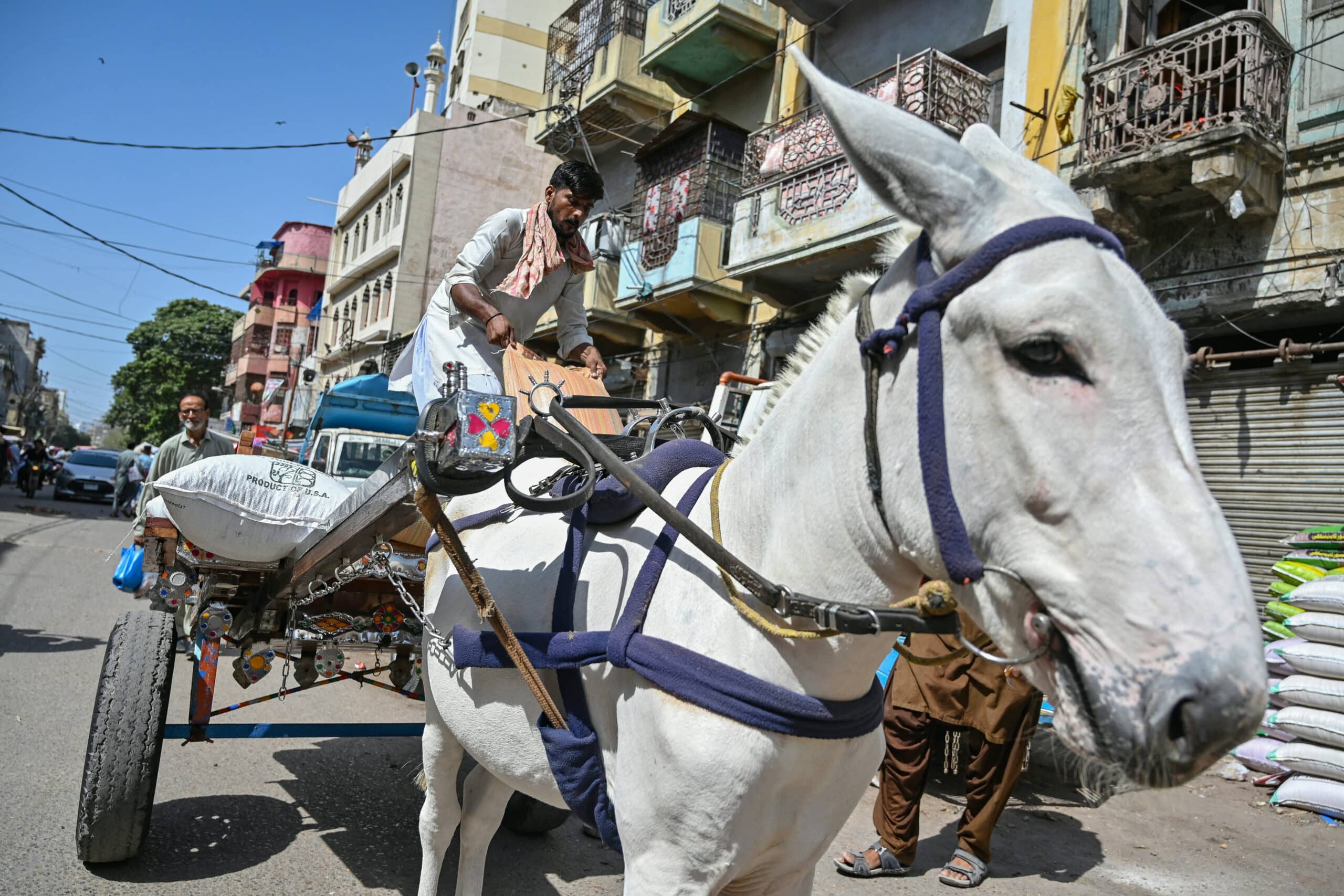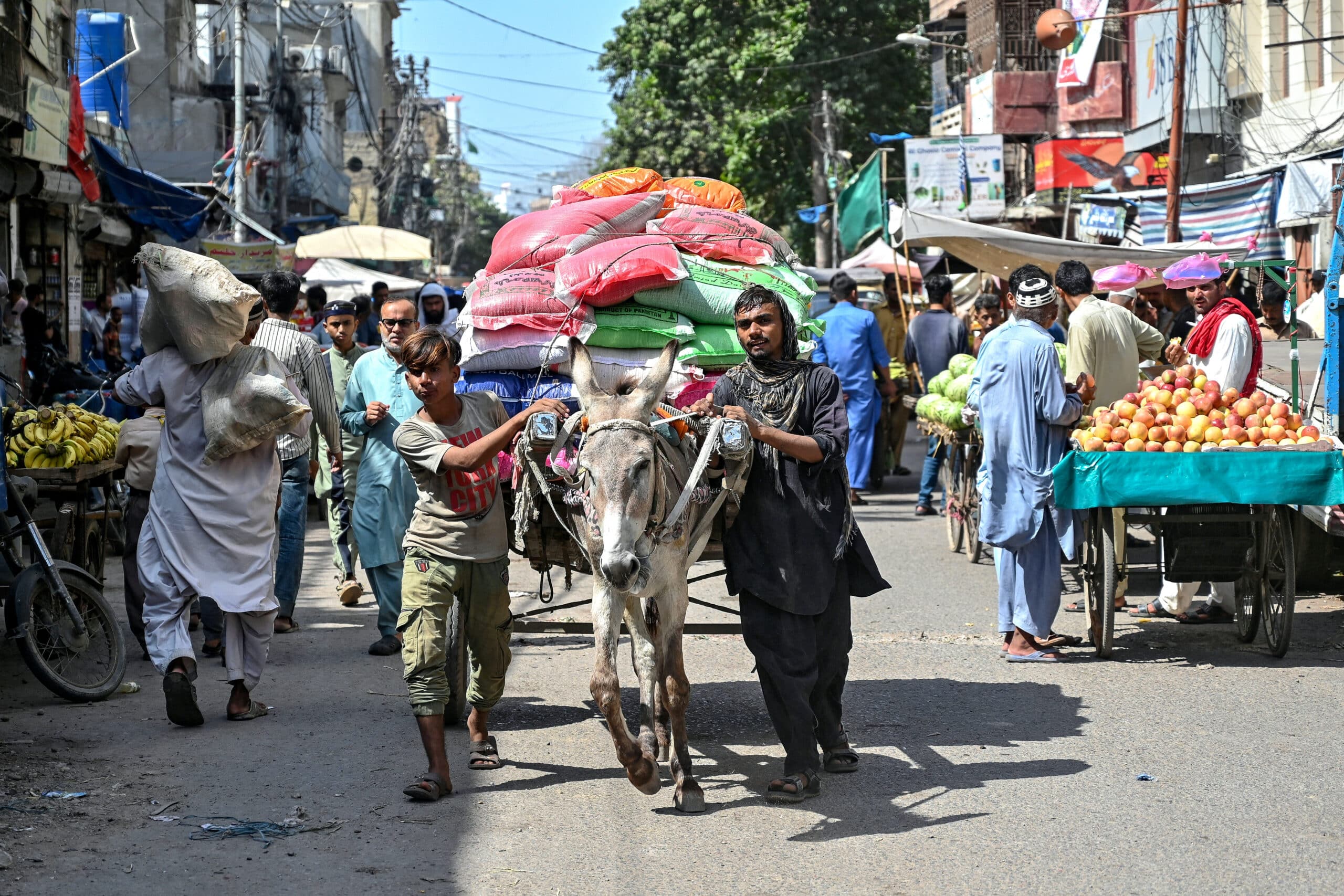haha777 Donkey business in Pakistan burdened by modern pressures


In this photograph taken on October 3, 2024, Mohammad Atif, the warden of a donkey called Raja – meaning “King,” unloads sacks of grains from his cart at a wholesale market in Karachi. – Droves of braying donkeys were once the backbone of Pakistan’s commercial hub Karachi, but growing upkeep costs and the surging sprawl of the city are putting them out to pasture. (Photo by Asif HASSAN / Agence France-Presse)
KARACHI, Pakistan — Droves of braying donkeys were once the backbone of Pakistan’s commercial hub Karachi, but growing upkeep costs and the surging sprawl of the city are putting them out to pasture.
Jittering donkey carts have long been essential for aftermarket transport from southern Karachi’s wholesale bazaars, nested in narrow streets preventing regular vehicles from accessing their trove of wares.
Article continues after this advertisementFor low-income workers, the beasts of burden provided a path to financial stability – their resilience, low overheads, and integral role guaranteeing a modest and stable profit to live off.
FEATURED STORIES BUSINESS National ID gives more Filipinos ‘face value BUSINESS BIZ BUZZ: Unwinding Gogoro … quietly BUSINESS Polvoron maker seeks P500 million capital for expansionBut punishing inflation has made feed costly whilst the city has exploded in size, accommodating around 50 times more people today than before Pakistan’s independence, with vast distances testing the animal’s limits.
“We continued the work of our fathers, but I want my kids to study and do something else,” said Mohammad Atif, the warden of a donkey called Raja – meaning “King.”
Article continues after this advertisementThe 27-year-old spends up to 750 rupees ($2.70) on hay for Raja per day. It used to cost just 200 rupees, the same amount Atif pays for a plate of food he splits with a colleague on increasingly common slow days.
Article continues after this advertisementREAD: Morocco quake: Donkeys deliver supplies to isolated areas
Article continues after this advertisement“Now you can’t make a living in this line of work,” Atif told Agence France-Presse in the colonial-era Bolton Market where everything from spices and water to cutlery and construction equipment is sold.
A good shift may earn him up to 4,000 rupees, far short of the expenses of his dependents and donkey.
Article continues after this advertisement Donkey business’ heyday is overThere are just shy of 6 million donkeys in Pakistan, according to government estimates, one for every 40 people in the country.
Local animal broker Aslam Shah told Agence France-Presse the majority of donkeys were in Karachi, which exploded into a megacity of more than 20 million people after mass migration in the partition of Pakistan and India.
But the 69-year-old said they’re no longer a desired commodity at an animal market held each Sunday.
“Sometimes weeks and months go by without us selling a single one,” he said.
Bolton Market springs to life at mid-morning as shopkeepers lift their shutters, and housewives in apartments above lower baskets from their balconies to collect orders of foodstuffs.


In this photograph taken on October 3, 2024, laborers along with a loaded donkey cart move through a street at a wholesale market in Karachi. – Droves of braying donkeys were once the backbone of Pakistan’s commercial hub Karachi, but growing upkeep costs and the surging sprawl of the city are putting them out to pasture. (Photo by Asif HASSAN / Agence France-Presse)
As customers prepare to leave, post-sale negotiations begin on who will win the work of hauling shopping away. But most donkey carts are empty with their owners and animals idle.
The carts were once so dominant on roads that the government issued them license plates. But the metropolis has sprawled with expressways and overpasses off-limits to animal carriages.
“I have been told there is lots to carry and that I would have to travel to the other side of the city to deliver goods,” said 21-year-old Ali Usman, in envy of a three-wheeled motorized rickshaw being loaded with rice sacks.
“It will take me three to four hours,” he said. “In this time, the rickshaw will have made two trips so the work has not been given to me.”
Stubbornly remainingNoman Farhat, a wholesaler at Empress Market, built in 1884, said he tries to give some work to donkey owners every day – a small act of mercy despite their impracticality.
“They are a part of our culture, and I would be loathe to see them go out of business,” he said.
READ: Donkeys turn into prized asset as Yemen economy sags
One Karachi animal welfare activist who asked to remain anonymous said increasingly long journeys and poor road conditions are knackering the animals.
“Due to a lack of resources, donkey owners use rope or a piece of cloth in place of proper harnesses leading to severe chaffing and skin wounds,” she said.
Mistreatment can also cause muzzle mutilation that restricts eating, she said.
But some stubbornly believe donkeys will remain at the heart of Karachi.
“Despite the harsh conditions they often face, these animals are an essential part of the informal economy,” said Sheema Khan, manager of Karachi’s Benji Project animal shelter.
“It is still the cheapest form of transport,” she said.
At a wholesale market, pointing to his two sons and grandson loading rice and wheat onto their carts, Ghulam Rasool is inclined to agree.
“This work will never end, it will endure till doomsday,” said the 76-year-old.
Subscribe to our daily newsletter
“So what if there are two or three days of no work? There will always be someone who needs us.”haha777
READ NEXT Jean Henri Lhuillier: The visionary behind Cebuana Lhuillier�... Bluetongue crisis: German sheep farmers feel abandoned EDITORS' PICK UPDATES: 2025 elections precampaign stories Kristine now a tropical storm; Signal No. 1 up in 24 areas nationwide INQside Look with senatorial aspirant Tito Sotto ASF vaccination expands to bigger piggeries Alex Eala bounces back at WTA 250 Guangzhou Open Party-list system: What to know ahead of 2025 polls MOST READ SC issues TRO vs Comelec resolution on dismissed public officials Tropical Storm Kristine slightly intensifies; Signal No. 2 in 5 areas LIVE UPDATES: Tropical Storm Kristine Green spaces driving growth: How Filinvest City's Park System enhanced its property value View commentsHot News
- 2024-09-27pgasia U.S. House Speaker Demands That U
- 2024-11-27777pub PVL: PLDT rolls past Capital1 for
- 2024-10-25777pub Sara on reconciliation with Marco
- 2024-09-30showtime India Emerges As Third Largest
- 2024-10-22showtime Bluetongue crisis: German sheep
- 2024-09-25fortune play Harris Enters Homestretch W
Related News
- haha777 Olivia Rodrigo grateful after ‘d
- haha777 Donkey business in Pakistan burd
- peso 888 Indonesia Vs Japan Live Streami
- showtime Love Paris? Now You Can Wear It
- manilaplay The Secret to Great Korean BB

